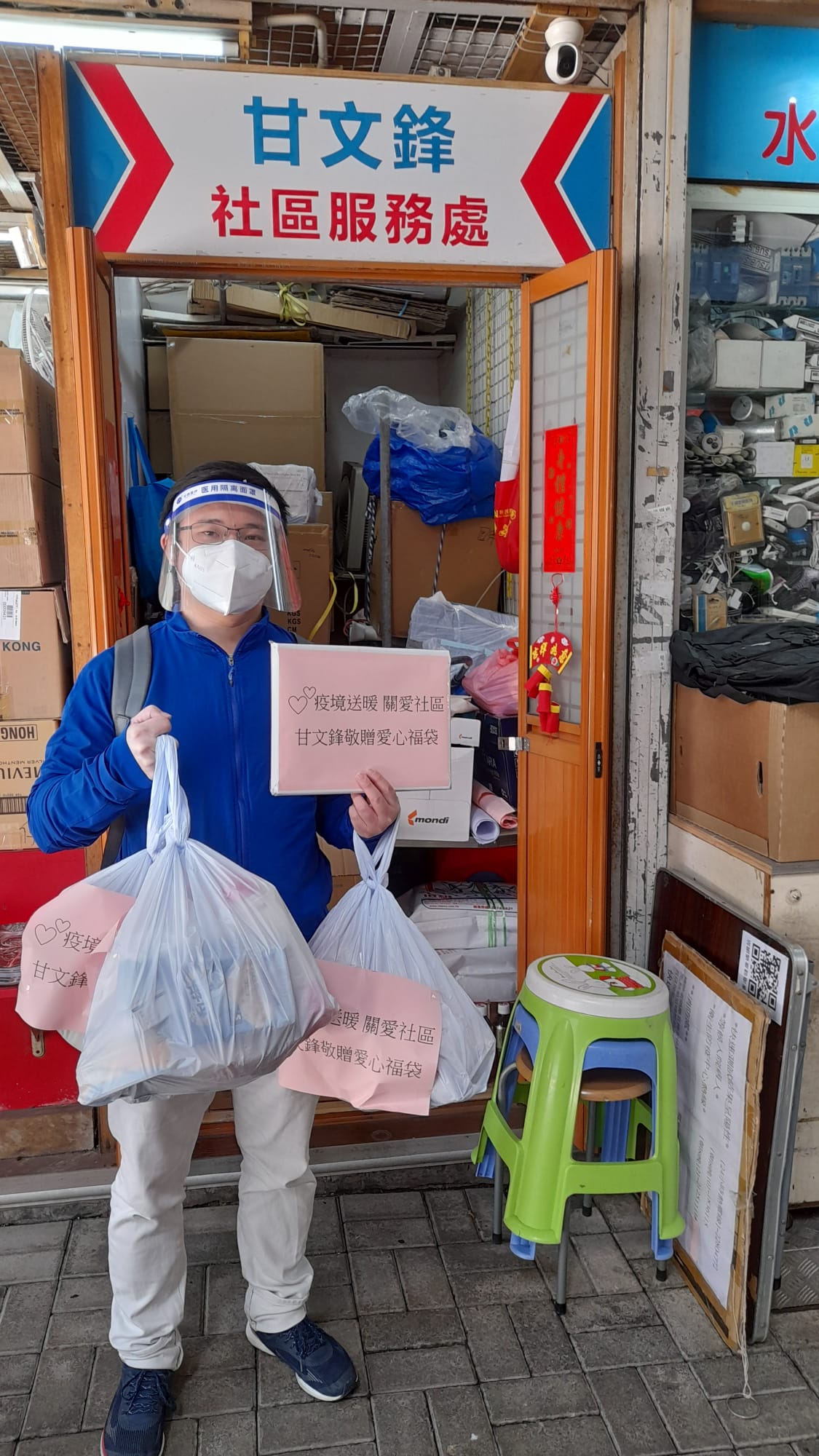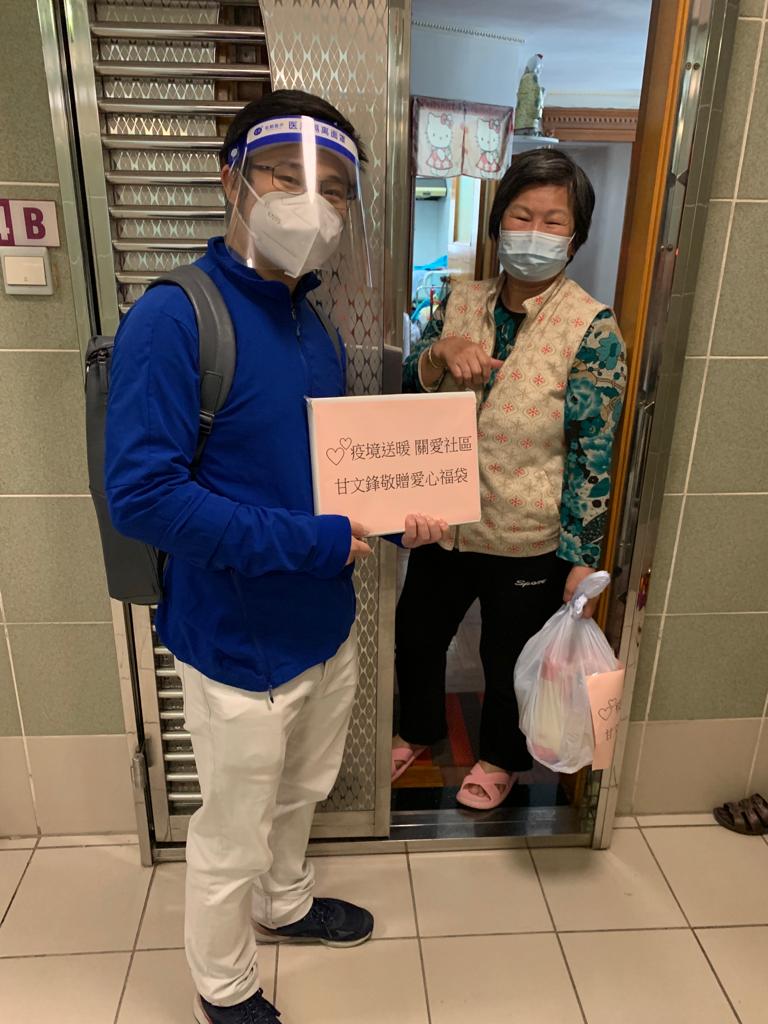To contain the worsening COVID-19 infections, the Chinese central government started to send a large amount of essential supplies in the middle of February in light of the request from Hong Kong SAR.
As of March 16, 94 million test kits, 600 thousand Chinese patent medicines, 622 TEUs fresh foods and other daily supplies have been transported to Hong Kong from Guangdong Province.
Moreover, in view of the shortage of medical staff in Hong Kong, over 522 medical experts and practitioners from Guangdong were sent to assist with PCR testing and treating patients with COVID-19.
“I would like to thank the central government, as well as the government of Guangdong for providing essential equipment and supplies,” said Kam Man-fung, former district councilor in Hong Kong. “The situation was much better with the aid from Chinese mainland.”
As a community worker who has been helping residents to fight against the virus, Mr. Kam shared his opinion about the anti-epidemic with GDToday, especially his perspectives on “one country, two systems” and “dynamic zero-COVID approach”.

(Photo provided to Newsgd.com)
“One country, two systems” is the back for Hong Kong’s development
According to a study led by Hong Kong University, Omicron infects and multiplies 70 times faster than the Delta variant and the original virus in human bronchus, which may explain why Omicron may transmit faster between humans than previous variants.
Mr Kam indicated that the strong infectiousness led to the increasing cases in Hong Kong over the last two months. He said, “People who get infected have to stay at home with their family as the hospitals are overburdened.”
“Family members would be infected, if the patients stay at home,” he added.
Now the problem has been solved.
Apart from the medical supplies and daily necessities that provided by the central government, a total of 6 mobile cabin hospitals were put into use one after another in March, following a monthly construction with the assistance from Chinese mainland.
According to the government of Hong Kong, these mobile cabin hospitals are mainly used for receiving and treating patients with mild symptoms.
“Building the mobile cabin hospitals is a crucial step fighting the epidemic in Hong Kong,” Mr. Kam commented. “People who get infected can be sent to the hospitals as soon as possible instead of staying at home, which means, their family members will be saved from exposure to the virus.”
Speaking of the situation in Hong Kong, Mr. Kam thinks that the worst has passed, thanks to aid from the central government. In his point of view, the aid shows the advantage of “one country, two systems”.
As Mr. Kam has observed, the safeguard from “one country, two systems” ensured the continuing operation of Hong Kong as an international financial center during the 5th wave of COVID-19 infections.
“The support from Chinese mainland is based on the effective control of the epidemic,” said Mr. Kam. “Other financial centers, like New York and London, they have an even worse situation in their society.”
“The cooperation between Hong Kong people and the medical personnel from the Chinese mainland are very important factors to overcome the 5th wave,” the former district councilor emphasized.
Furthermore, Mr. Kam stressed that the Chinese mainland and Hong Kong are not in a competitive relationship, but a mutually beneficial relationship.
“I hope that Hong Kong people and people from Chinese mainland could have a better communication and understanding,” said Mr. Kam. “We should know more about each other, which leads to a better country and better future.”
Dynamic zero-COVID approach is an effective measure to contain the virus
On March 21, Carrie Lam, the Chief Executive of Hong Kong announced that current epidemic-control measures will be eased step by step starting from April 1.
In addition, she also announced that the government has decided to suspend the Compulsory Universal Testing scheme which was originally planned to be carried out within March.
The decision about easing the current epidemic-control measures has led to a wide discussion: will Hong Kong adopts herd immunity instead of Dynamic zero-COVID approach?
Mr. Kam believes that the decision about deferring the massive COVID test is based on the suggestions not only from local experts, but also from the experts from Chinese mainland.
“The first task is to break the transmission chain and end the 5th wave as soon as possible,” Mr. Kam indicated.
As far as Mr. Kam concerned, the dynamic zero-COVID approach is an effective measure for epidemic control. It can not only cut off the transmission chain as soon as possible, but also enable the running of society, which would not be interrupted by the epidemic.
He took Shenzhen, the neighboring city of Hong Kong as an example to further explain his opinion.
“The city strengthened epidemic control measures with very good timing and the city returned to normal life in a short time,” he said.
On March 14, in order to find and treat the patients with COVID-19 as soon as possible, the city of Shenzhen decided to put all residential communities under closed management, close stores and business, suspend transportation and launched three rounds of citywide testing.
On March 27, with the new local cases down to one-digit number from previous three-digit number, the city decided to lift most of the control measures and resumed production.
Mr. Kam found that the reason why the whole campaign could run smoothly is that there’s strong coordination between government, community workers, volunteers and residents.
“On Chinese mainland, government can organize and promote policies with a lot of support from the residents,” said Mr. Kam. “This is the experience we should learn from the cities in Chinese mainland, about how to conduct strict management, mass COVID test and the coordination between government, communities and volunteers.”
“We may live with the virus for a long term,” he assumed. “But we also hope that all the elderly and people with chronic illness can survive through this virus.”
“That’s why I think we should support the dynamic zero COVID policy at this moment,” he added.

(Photo provided to Newsgd.com)
Author: Steven Yuen, Hannah Zhou
Video script: Hannah Zhou, Reese Deng (intern)
Video: Zoey Zhang
Subtitle: Hannah Zhou, Jiang Chang (intern)
Video editor: Xie Miaofeng, Jasmine Yin, Ou Xiaoming
Editor: Wing Zhang, Jerry Grey
















